
African Journal of Rhetoric
Scope & Guideline
Transforming Discourse Through Diverse Perspectives
Introduction
Aims and Scopes
- Rhetorical Analysis of Political Discourse:
The journal places a strong emphasis on analyzing political rhetoric, particularly in the context of African leadership, governance, and socio-political movements. This includes the examination of speeches, public communication, and the impact of rhetoric on democracy and civic engagement. - Cultural and Artistic Rhetoric:
There is a consistent focus on the rhetoric found in African literature, film, and music. The journal seeks to understand how cultural expressions convey messages, challenge narratives, and foster identity among African communities. - Interdisciplinary Approaches to Rhetoric:
The journal encourages interdisciplinary research that combines rhetoric with other fields such as history, sociology, and cultural studies, thereby enriching the discourse surrounding African rhetoric. - Social Media and Contemporary Rhetoric:
Research on how social media platforms serve as new arenas for public discourse and rhetoric is a core area of interest, reflecting the changing nature of communication in the digital age. - Critical Examination of Historical Narratives:
The journal addresses how historical events, particularly those related to conflict and colonialism, are represented and interpreted through rhetorical frameworks, thus contributing to the understanding of memory and identity.
Trending and Emerging
- Afrofuturism and Cultural Imaginations:
Recent articles highlight the intersection of Afrofuturism with rhetoric, exploring how futuristic narratives in African literature and media challenge traditional representations and envision new possibilities for identity and agency. - Rhetoric of Health and Crisis Communication:
The COVID-19 pandemic has spurred a surge in research on health communication and the rhetoric surrounding public health crises. This theme encompasses the analysis of governmental responses and the role of social media in shaping public discourse. - Gender and Rhetorical Representation:
Emerging themes focus on the representation of gender in rhetoric, particularly in the context of African media and narratives. This reflects a growing interest in how gender dynamics influence political and social discourse. - Diasporic Rhetoric and Identity:
There is an increasing interest in the rhetoric surrounding the African diaspora, particularly how identity and belonging are constructed and contested in both African and global contexts. - Humor and Political Rhetoric:
The use of humor as a rhetorical strategy in political discourse is gaining attention, particularly in the context of social media and political satire, revealing new dimensions of public engagement and critique.
Declining or Waning
- Classic Rhetorical Traditions:
There has been a noticeable decrease in papers focusing on classical rhetoric and its applications within African contexts. This suggests a shift towards more contemporary and localized forms of rhetoric that resonate with current socio-political issues. - Historical Rhetoric of Colonialism:
Although historical analyses remain important, the direct focus on colonial rhetoric has waned. This may indicate a broader pivot toward exploring post-colonial narratives and their implications on modern African identity. - Rhetoric of International Relations:
Research that specifically examines the rhetoric surrounding international relations and diplomacy in Africa appears less frequently, possibly reflecting a growing interest in domestic rather than international discourses.
Similar Journals

PHILOSOPHY AND RHETORIC
Advancing Critical Dialogue in Philosophy and RhetoricPhilosophy and Rhetoric, published by Penn State University Press, serves as a premier interdisciplinary journal at the intersection of philosophical inquiry and rhetorical analysis. With an ISSN of 0031-8213 and an E-ISSN of 1527-2079, this journal has been a vital platform for scholars since its inception, converging critical discussions from 2002 to 2024. Rated in the third quartile of philosophy journals in 2023, it ranks #272 out of 806 in the Scopus Arts and Humanities category, placing it in the 66th percentile among academic publications. By offering rich insights into theoretical frameworks and practical applications of rhetoric in philosophical discourse, Philosophy and Rhetoric is an invaluable resource for researchers, professionals, and students aiming to enhance their understanding of rhetorical practices and their implications in contemporary philosophical discussions. Although currently not available as an open-access journal, its subscription model ensures that the quality and rigor of the content remain of the highest standard, supporting the academic community's ongoing pursuit of knowledge.
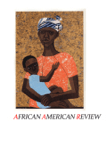
AFRICAN AMERICAN REVIEW
Advancing Conversations on African American Cultural NarrativesAFRICAN AMERICAN REVIEW, published by the Johns Hopkins University Press, stands as a pivotal journal since its inception, dedicated to exploring the multifaceted aspects of African American literature, culture, and artistic expression. With an ISSN of 1062-4783 and an E-ISSN of 1945-6182, this journal provides a critical platform that delves into the rich tapestry of African American experiences, bridging gaps across literary, cultural, and visual arts disciplines. Its latest impact metrics position it in esteemed quartiles, achieving Q2 rank in both Literature and Literary Theory and Visual Arts and Performing Arts, alongside a strong presence in Cultural Studies with a Q3 classification. The journal’s commitment to high-quality scholarship is reflected in its Scopus rankings, drawing attention from researchers and scholars invested in cultural narratives and historical contexts. Although not currently open access, the journal's comprehensive analyses contribute significantly to discussions in academia and beyond, making it an essential resource for researchers, educators, and students alike looking to deepen their understanding of African American contributions to the arts and humanities.
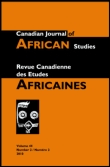
CANADIAN JOURNAL OF AFRICAN STUDIES
Exploring Africa's Rich Tapestry of Cultures and HistoriesThe Canadian Journal of African Studies is a premier scholarly publication dedicated to the exploration and critical analysis of African cultures, societies, and histories. Founded in 1976 and published by Routledge Journals, Taylor & Francis Ltd, this journal serves as a vital platform for researchers, educators, and practitioners in various fields, including Anthropology, Cultural Studies, History, and Political Science. With its notable Scopus rankings, including a 96th percentile in History and a 89th percentile in Cultural Studies, the journal exemplifies academic excellence and influence within the social sciences. Although the journal does not currently offer open access options, it remains committed to providing high-quality research articles that contribute to the understanding of African issues in a global context. By addressing pressing social and political challenges, the Canadian Journal of African Studies not only serves academic interests but also fosters a deeper appreciation of Africa's diverse experiences and perspectives.
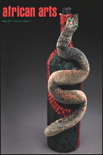
AFRICAN ARTS
Advancing Scholarship in African Arts and CultureAFRICAN ARTS is a distinguished journal published by MIT PRESS, focusing on the vibrant intersections of literature, visual arts, and performing arts within the African context. Boasting an ISSN of 0001-9933 and an E-ISSN of 1937-2108, this journal serves as a critical platform for scholars and practitioners worldwide to explore and disseminate their research on African artistic expressions. With a solid impact represented by its Q3 rankings in both Literature and Literary Theory and Visual Arts and Performing Arts as of 2023, it ranks in the top 20% within the literature category and in the top 30% for visual arts. AFRICAN ARTS aims to foster a deeper understanding of the cultural, historical, and social contexts that shape these disciplines, embracing a wide array of methodologies and theoretical frameworks. Though not an open-access journal, it provides valuable insights and analysis that contribute significantly to the global discourse surrounding African arts, making it a vital resource for researchers, professionals, and students alike.

COLLEGE ENGLISH
Empowering Voices in the Field of English Language TeachingCOLLEGE ENGLISH, ISSN 0010-0994, is a premier academic journal published by the NATIONAL COUNCIL OF TEACHERS OF ENGLISH that serves as a pivotal platform for the advancement of research and scholarly discussion in the fields of education and linguistics. With a strong focus on the intersection of language and teaching, this journal has established its reputation with notable Scopus rankings, achieving a Q2 category in Education and a Q1 category in Linguistics and Language as of 2023. The journal’s commitment to high-quality research is further evidenced by its placement in the top 20th percentile for Arts and Humanities—Language and Linguistics. By providing a rigorous forum for educators, researchers, and students alike, COLLEGE ENGLISH fosters an environment conducive to innovative ideas and interdisciplinary dialogue, promoting deeper understanding and effective teaching practices. Although it does not provide Open Access options, the journal continues to be an essential resource for those aiming to enhance their academic pursuits in the evolving landscape of language education.
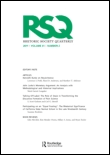
Rhetoric Society Quarterly
Illuminating the Complexities of Rhetorical Scholarship.Rhetoric Society Quarterly, ISSN 0277-3945, is a distinguished academic journal published by Routledge Journals, Taylor & Francis Ltd, based in the United Kingdom. Since its inception in 1976, the journal has become a vital platform for scholarly discourse in the fields of Communication and Linguistics and Language, showcasing research that examines the complexities of rhetoric across various contexts. Currently enjoying a Q2 ranking in Communication and an impressive Q1 ranking in Linguistics and Language, it is recognized for its rigorous peer-review process and commitment to quality. With an H-index reflective of its scholarly influence and reaching across generations of research leading up to 2024, the journal continues to be a crucial resource for researchers, educators, and practitioners. Although it does not currently offer open access options, readers can expect high-quality, impactful articles that contribute significantly to their fields. Explore the rich tradition of rhetorical scholarship and engage with a community dedicated to advancing knowledge and practice within this ever-evolving domain.
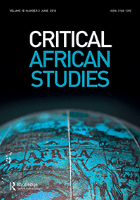
Critical African Studies
Illuminating Africa's Diverse PerspectivesCritical African Studies, published by TAYLOR & FRANCIS LTD, is a premier journal dedicated to advancing the discourse on critical issues affecting Africa and its diaspora. With an ISSN of 2168-1392 and an E-ISSN of 2040-7211, this journal has established itself as a leading publication in the field of Arts and Humanities, ranked Q1 in Arts and Humanities (miscellaneous) and Q2 in Social Sciences (miscellaneous) as of 2023, showcasing its commitment to high-quality research. Over its converged years from 2015 to 2024, it has become a critical platform for scholars and practitioners to explore diverse perspectives, innovative ideas, and multidisciplinary approaches to issues such as social justice, governance, and cultural narratives within the African context. The journal's Scopus rankings reflect its significant impact, with impressive placements in both the Arts and Humanities and Social Sciences categories. Critical African Studies aims to foster a robust dialogue among researchers, professionals, and students, making it essential reading for anyone interested in the complexities of Africa's socio-political landscape and cultural heritage.
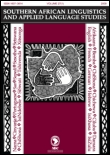
Southern African Linguistics and Applied Language Studies
Exploring the Rich Tapestry of Southern African LanguagesSouthern African Linguistics and Applied Language Studies is a prestigious journal dedicated to the exploration and analysis of linguistics and applied language studies within the Southern African context. Published by Taylor & Francis Ltd, this esteemed journal has established itself as a significant platform for scholars and practitioners since its inception in 2003. With an impressive Q2 ranking in the Linguistics and Language category and a current Scopus rank of #430 out of 1167, it occupies a vital position in the academic landscape, appealing to a diverse readership keen on linguistic research, language policy, and applied linguistics. While the journal is not currently open access, it provides comprehensive insights and scholarly articles that foster understanding and innovation in linguistic practices and language education. As of 2024, the journal continues to deepen its impact through rigorous peer-review and a commitment to advancing knowledge, making it a key resource for researchers, educators, and students seeking to navigate the complexities of language within the Southern African region and beyond.
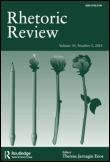
Rhetoric Review
Illuminating the Nuances of Rhetorical DiscourseRhetoric Review, published by Routledge Journals, Taylor & Francis Ltd, serves as a vital platform for scholars in the fields of Rhetoric, Linguistics, and Literary Theory. Established in 1982, this esteemed journal presents a blend of theoretical frameworks and empirical studies that advance our understanding of rhetorical practices across diverse contexts. It holds a prestigious Q1 ranking in Literature and Literary Theory and a Q2 ranking in Linguistics and Language as of 2023, reflecting its influential role in shaping contemporary discourse in these disciplines. With an impressive Scopus rank of #85 out of 1106 in Literature and Literary Theory, Rhetoric Review is a go-to resource for researchers, professionals, and students aiming to explore the intricacies of language and communication. While the journal is not open access, it offers a comprehensive range of articles, reviews, and theoretical discussions that contribute significantly to both academic scholarship and practical applications in rhetoric. The journal’s commitment to publishing pioneering research ensures its relevance in an ever-evolving academic landscape.
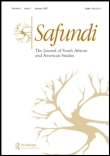
Safundi
Empowering Researchers to Shape Cultural ConversationsSafundi, published by Routledge Journals, Taylor & Francis Ltd, is a distinguished peer-reviewed journal dedicated to exploring the intersections of culture, history, and political science. Since its inception in 2000, Safundi has contributed significantly to the discourse on cultural studies, positioning itself as a vital resource for researchers and professionals alike. With an Impact Factor reflective of its rigorous scholarship, the journal is ranked in the top quartiles for cultural studies and history, showcasing its influence and authority within these fields. The journal addresses critical contemporary issues, aiming to foster a nuanced understanding of cultural dynamics and historical contexts. While access options are traditional, Safundi remains committed to disseminating pivotal research that resonates with academics and policymakers. As it continues to evolve through to 2024, Safundi serves as an indispensable platform for students and scholars seeking to contribute to the vibrant dialogue surrounding culture and its implications in our global society.